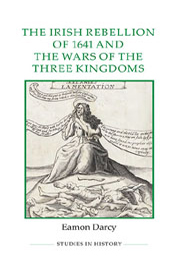Book contents
- Frontmatter
- Contents
- Acknowledgements
- Abbreviations
- Introduction
- 1 Representing violence and empire: Ireland and the wider world
- 2 Imagined violence? The outbreak of the 1641 rebellion in Ireland
- 3 Manufacturing massacre: the 1641 depositions and the Wars of the Three Kingdoms
- 4 The 1641 rebellion and violence in the New and Old Worlds
- 5 Contesting the 1641 rebellion
- Conclusion: The 1641 rebellion in its British, European and Atlantic world context
- Bibliography
- Index
4 - The 1641 rebellion and violence in the New and Old Worlds
Published online by Cambridge University Press: 05 May 2013
- Frontmatter
- Contents
- Acknowledgements
- Abbreviations
- Introduction
- 1 Representing violence and empire: Ireland and the wider world
- 2 Imagined violence? The outbreak of the 1641 rebellion in Ireland
- 3 Manufacturing massacre: the 1641 depositions and the Wars of the Three Kingdoms
- 4 The 1641 rebellion and violence in the New and Old Worlds
- 5 Contesting the 1641 rebellion
- Conclusion: The 1641 rebellion in its British, European and Atlantic world context
- Bibliography
- Index
Summary
The seventeenth century, in the eyes of numerous scholars, was an exceptionally violent time to be alive. War and rebellions in Ireland and the Atlantic world were followed by violent conquests by colonial armies. Accounts by conquistadores, English colonists and detached observers all recounted the brutality of these armed conflicts. The highly charged confessional character of European political and social relations precipitated violent events such as the St Bartholomew's Day massacre, the Piedmont massacre and facilitated the interpretation of the Thirty Years' War through a sectarian prism. The purpose of this chapter, therefore, is to investigate whether there were similarities between how the Irish rebellion was presented in English newsbooks and pamphlets and the portrayal of atrocities that occurred across the New and Old Worlds. It focuses entirely on reports of violent events published in the seventeenth century and provides a vital snapshot as to how such incidents were portrayed by English printers. Were pamphlets that described events in Ireland exceptional in their brutal and bloody content? What factors shaped the construction of these accounts?
Atrocities during the Thirty Years' War
The proliferation of news reports on the Thirty Years' War indicates a high level of interest in events in Europe among Englishmen and women. These pamphlets have come under much scrutiny. Barbara Donagan believed that news from Germany provided English people with a prime example of a bloody conflict that warned them ‘of the poverty, depopulation and barbarism war could bring to a once prosperous country’.
- Type
- Chapter
- Information
- The Irish Rebellion of 1641 and the Wars of the Three Kingdoms , pp. 102 - 131Publisher: Boydell & BrewerPrint publication year: 2013



